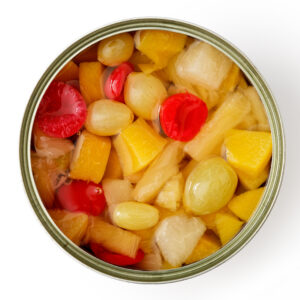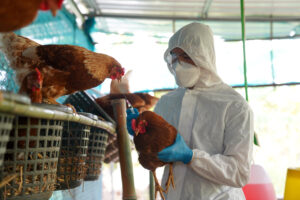May 2015 – Navajo Pride shuts down operation for a year following voluntary flour recall due to possible Salmonella contamination. May 2016 — General Mills recalls several types of flour due to E. coli illnesses FDA and CDC linked to eating uncooked dough and batter made with raw flour. May 2017 – An E. coli outbreak in Canada is traced to flour produced by Colorado-based Ardent Mills with Canadian wheat. The flour recalls began in March, with updates on additional brands and products added since then. Flour has never been considered to be a ready-to-eat (RTE) food. It is not treated as such in the field, in production, or at the consumer’s home. But with the regular flow of recalls caused by consumer consumption of raw flour, that may be about to change. In fact, I was in Canada last week where the current recall and investigation is occurring and the Canadian government is telling people to treat flour in their kitchen like raw poultry. Both the Canadian and the U.S. governments have put out warnings on flour, similar to those issued for RTE foods: As stated by the Canadian Food Inspection Agency (CFIA): “Do not eat uncooked dough or batter made with raw flour. Flour is made from wheat that is grown outdoors where bacteria are often present. Flour is typically not treated to kill bacteria during the normal milling process.” From the U.S. Health & Human Services foodsafety.gov: “Do not eat or play with flour, raw dough, or raw batter that is intended to be cooked. Do not use flour in items that are not intended to be cooked.” A good explanation of the problem with flour was detailed in a May 28 Montreal Gazette article which cites food safety expert Scott Lougheed, a PhD candidate in the School of Environmental Studies at Queen’s University. “E. coli is a bacterium that lives in the digestive tracts of humans and animals … if an infected animal or rodent walks through a wheat field and defecates there, they could leave infected feces behind. That material could then be gathered up by a wheat harvester and spread throughout the harvested grain.” The article goes on to explain that because E. coli prefer warm, moist environments, the friction of flour mills “can create enough warmth to allow the bacteria to multiply, but not enough heat to kill it. And if any humidity enters the mill or the grain holding tanks, that can set up the ideal growth conditions.” The bacteria can then survive in the dry environment of the flour bag on the store shelf and home pantry. The issue is specific to flour because other grains such as oats are steamed before they are rolled or cut; barley or rice are usually eaten cooked. Thus, flour is, in fact, a raw food – though it is not treated as such by consumers. We don’t perceive a need to wash our hands after working with flour, nor do most home cooks think to sanitize the surfaces where flour can fly while working with it. So, what does all this mean to the food industry? What I see as most obvious is that it raises questions as to what is RTE and what is not RTE and the impact of these events on regulators and advice to consumers. FDA has told us to take into account the ways in which consumers use food to help determine the risk associated with that food. This was clearly the issue with the infamous cookie dough outbreak due to E. coli O157:H7 several years ago – an outbreak that clearly drove change in the food industry. Are we now in the same place with raw flour? The questions impact all segments of the industry – from produce to meat … to baking goods. In the Produce Safety Rule, for example, FDA exempts produce that is “rarely consumed raw.” However, there are a number of “rarely consumed raw” produce items for which one can find numerous online recipes for its raw use (e.g., asparagus, eggplant, etc.) . So how rare is this consumption really? And how about “no-bake” play-dough recipes with the main ingredient being flour. In the Jack in the Box E. coli outbreak, at least one child died from playing with a toy touched by a person who had eaten a contaminated burger. It’s no long step to imagine a similar outcome for children who play with raw flour. Will this impact regulation? Very likely. Eventually. But at the speed that regulation flows, I would recommend that, for both consumer and brand protection, any company selling a raw product to consumers take steps to determine if it is cost effective to add a viable kill step that would not compromise the product, and look for other cost effective ways to reduce the risk through supply chain and processing controls. The question: “Should we do more testing?” will arise. As with all testing, it is very costly and complex to test to any degree of certainty so for bulk ingredients like flour it may be difficult to devise cost-effective testing programs. Companies may want to add some consumer advice statements. For example, immediately following the opening statement on its consumer information post that it has recalled several types of flour, General Mills states: “Illnesses have NOT come from properly baked or cooked flour. Remember
Do not eat uncooked dough or batter made with raw flour. Flour is made from wheat that is grown outdoors where bacteria are often present. Flour is typically not treated to kill bacteria during the normal milling process.” However, with consumers better served by receiving such advice and warnings before a recall occurs, and whether it becomes mandated by regulation or not, such warnings are likely to become a standard for any food product that is consumed raw without a production kill step. It could become one more piece you will need to inform your marketing team that it must fit on the label. So, with all this, you may want to consider convening your food safety team to delve further than ever before into the question: Are we actually producing an RTE product? And, if we are, what are our risks, and what can we do protect the consumer and our brand? About The Acheson Group (TAG) Led by Former FDA Associate Commissioner for Foods Dr. David Acheson, TAG is a food safety consulting group that provides guidance and expertise worldwide for companies throughout the food supply chain. With in-depth industry knowledge combined with real-world experience, TAG’s team of food safety experts help companies more effectively mitigate risk, improve operational efficiencies, and ensure regulatory and standards compliance. www.AchesonGroup.com






